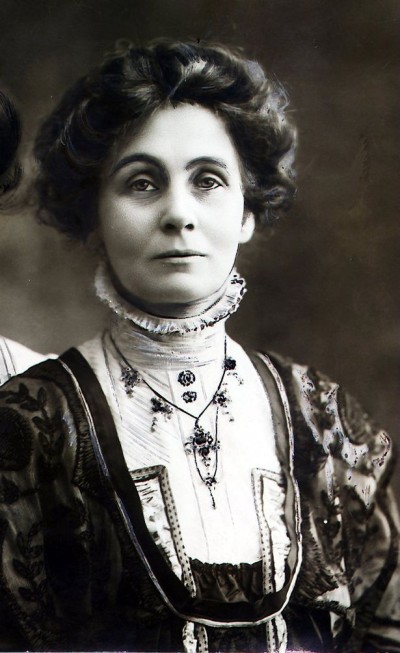Emmeline Pankhurst (Emmeline Pankhurst Pankhurst)

Emmeline Pankhurst (born Goulden; 15 July 1858 – 14 June 1928) was a British political activist and leader of the British suffragette movement who helped women win the right to vote. In 1999 Time named Pankhurst as one of the 100 Most Important People of the 20th Century, stating: “she shaped an idea of women for our time; she shook society into a new pattern from which there could be no going back.” She was widely criticised for her militant tactics, and historians disagree about their effectiveness, but her work is recognised as a crucial element in achieving women’s suffrage in Britain.
Born in Moss Side, Manchester, to politically active parents, Pankhurst was introduced at the age of 8 to the women’s suffrage movement. Although her parents encouraged her to prepare herself for life as a wife and mother, she attended the École Normale de Neuilly in Paris. In 1878 she married Richard Pankhurst, a barrister 24 years her senior known for supporting women’s right to vote; they had five children over the next ten years. He supported her activities outside the home, and she founded and became involved with the Women’s Franchise League, which advocated suffrage for both married and unmarried women. When that organisation broke apart, she tried to join the left-leaning Independent Labour Party through her friendship with socialist Keir Hardie but was initially refused membership by the local branch on account of her sex. While working as a Poor Law Guardian, she was shocked at the harsh conditions she encountered in Manchester’s workhouses.
In 1903, five years after her husband died, Pankhurst founded the Women’s Social and Political Union (WSPU), an all-women suffrage advocacy organization dedicated to “deeds, not words.” The group identified as independent from – and often in opposition to – political parties. It became known for physical confrontations: its members smashed windows and assaulted police officers. Pankhurst, her daughters, and other WSPU activists were sentenced to repeated prison sentences, where they staged hunger strikes to secure better conditions. As Pankhurst’s oldest daughter Christabel took leadership of the WSPU, antagonism between the group and the government grew. Eventually the group adopted arson as a tactic, and more moderate organisations spoke out against the Pankhurst family. In 1913 several prominent individuals left the WSPU, among them Pankhurst’s daughters Adela and Sylvia. Emmeline was so furious that she “gave [Adela] a ticket, £20, and a letter of introduction to a suffragette in Australia, and firmly insisted that she emigrate,” in which she complied. The family rift was never healed. Sylvia became a socialist.
With the advent of the First World War, Emmeline and Christabel called an immediate halt to militant suffrage activism in support of the British government’s stand against the “German Peril.” They urged women to aid industrial production and encouraged young men to fight, becoming prominent figures in the white feather movement. In 1918 the Representation of the People Act granted votes to all men over the age of 21 and women over the age of 30. This discrepancy was intended to ensure that men did not become minority voters as a consequence of the huge number of deaths suffered during the First World War. Pankhurst transformed the WSPU machinery into the Women’s Party, which was dedicated to promoting women’s equality in public life. In her later years she became concerned with what she perceived as the menace posed by Bolshevism and joined the Conservative Party, and was selected as a Conservative Party candidate for Stepney in 1927. She died on 14 June 1928, only weeks before the Conservative government’s Representation of the People Act (1928) extended the vote to all women over 21 years of age on 2 July 1928. She was commemorated two years later with a statue in London’s Victoria Tower Gardens.
Emmeline Pankhurst’s campaign for Parliament was pre-empted by her ill health and a final scandal involving Sylvia. The years of touring, lectures, imprisonment and hunger strikes had taken their toll; fatigue and illness became a regular part of Pankhurst’s life. Even more painful, however, was the news in April 1928 that Sylvia had given birth out of wedlock. She had named the child Richard Keir Pethick Pankhurst, in memory of her father, her ILP comrade, and her colleagues from the WSPU respectively. Emmeline was further shocked to see a report from a newspaper in the US that declared that “Miss Pankhurst” – a title usually reserved for Christabel – boasted of her child being a triumph of “eugenics,” since both parents were healthy and intelligent. In the article, Sylvia also spoke of her belief that “marriage without legal union” was the most sensible option for liberated women. These offences against the social dignity which Pankhurst had always valued devastated the elderly woman; to make matters worse, many people believed the “Miss Pankhurst” in newspaper headlines referred to Christabel. After hearing the news, Emmeline spent an entire day crying; her campaign for Parliament ended with the scandal.
As her health went downhill, Emmeline Pankhurst moved into a nursing home in Hampstead. She requested that she be treated by the doctor who attended to her during her hunger strikes. His use of the stomach pump had helped her feel better while in prison; her nurses were sure that the shock of such treatment would severely wound her, but Christabel felt obligated to carry out her mother’s request. Before the procedure could be carried out, however, she fell into a critical condition from which none expected her to recover. On Thursday 14 June 1928 Pankhurst died, at the age of 69. She was interred in Brompton Cemetery in London.
Born
- July, 15, 1858
- Moss Side, Manchester, Lancashire, England
Died
- June, 14, 1928
- Hampstead Greater London, England
Cemetery
- Brompton Cemetery
- West Brompton, Greater London, England




